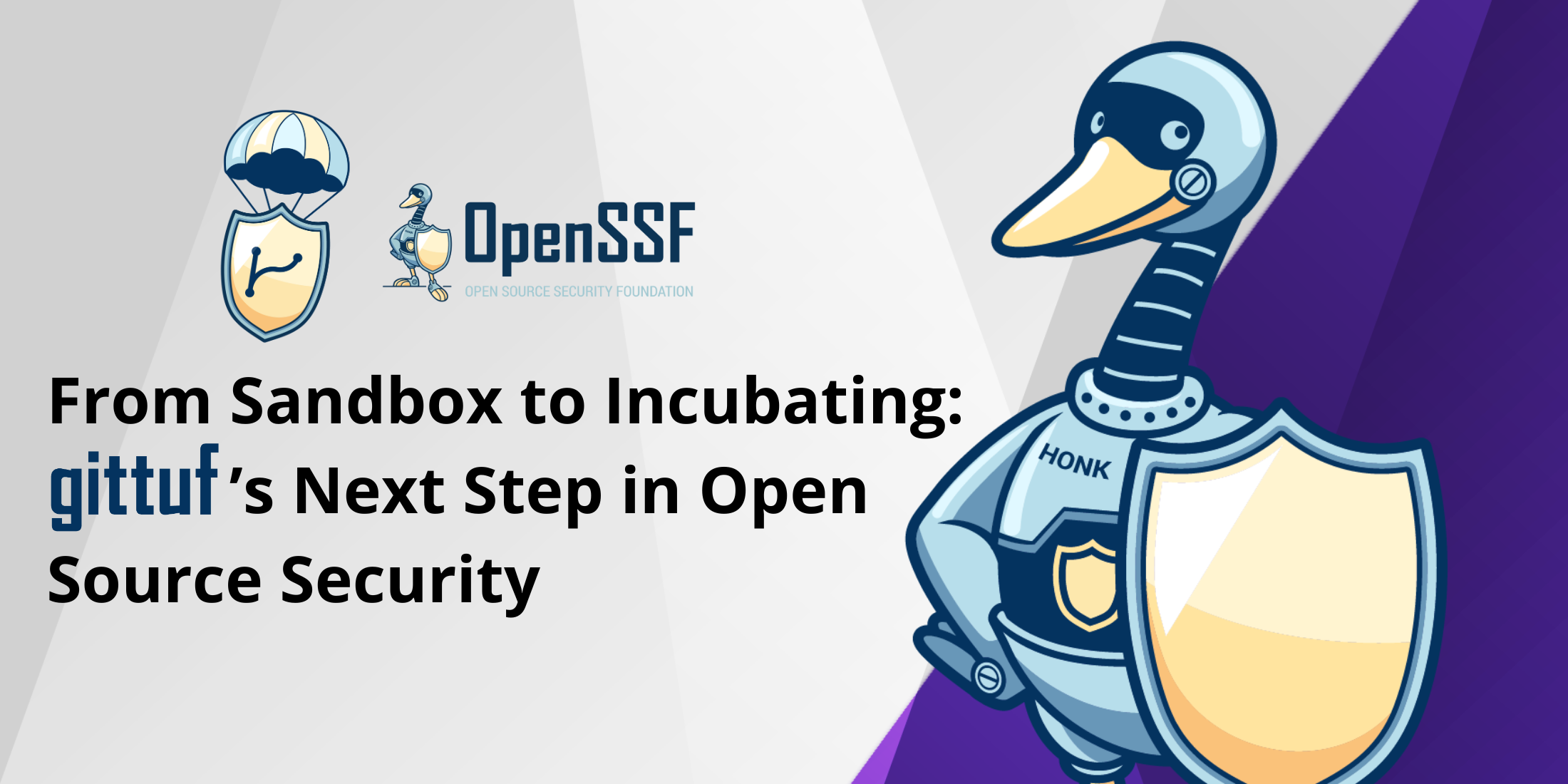


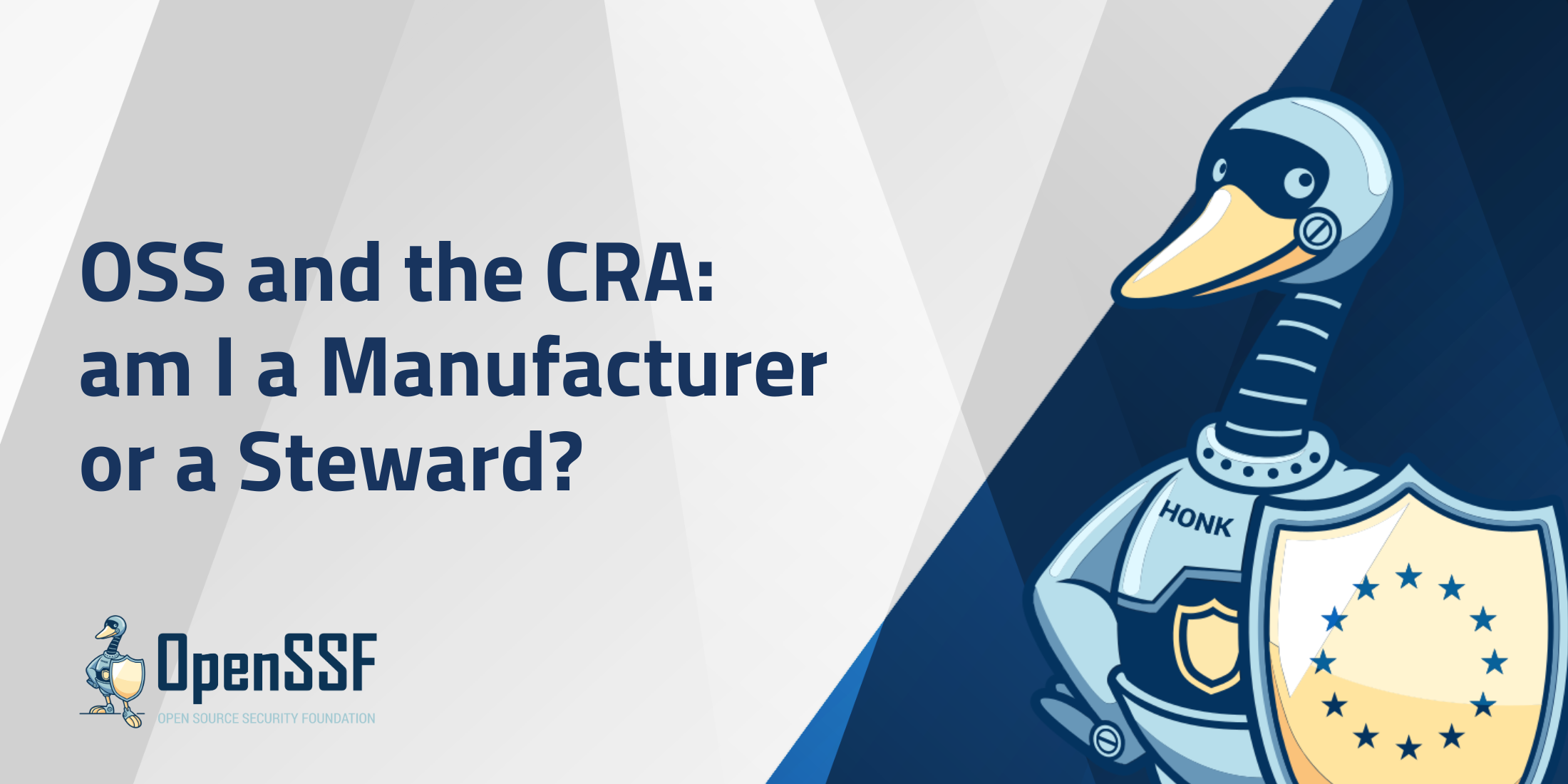
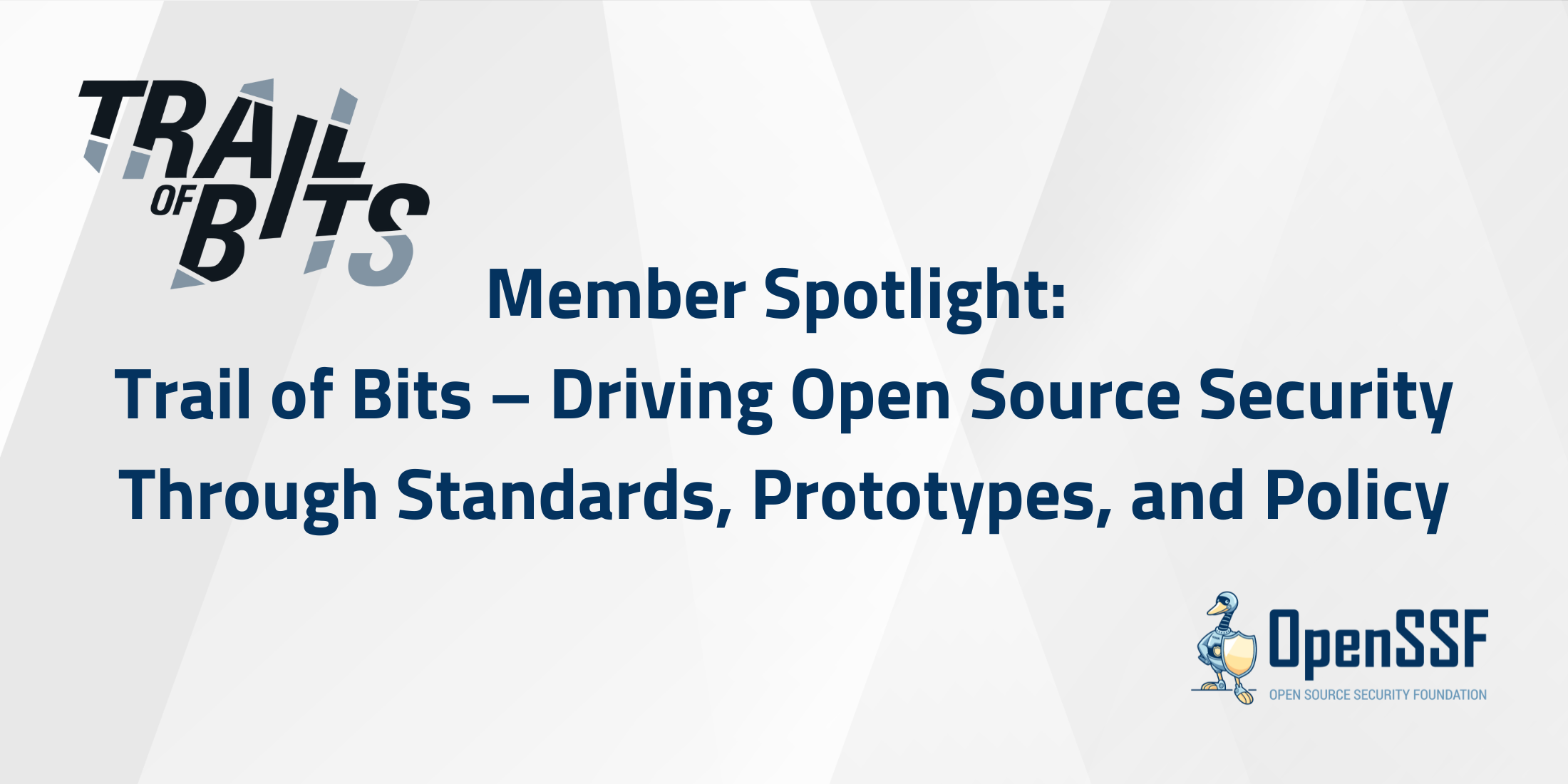
Trail of Bits is a leading cybersecurity research, engineering, and consulting firm that works with some of the most security-conscious organizations in the world—including Facebook, government agencies like DARPA, and prominent cryptocurrency protocols. Founded in 2012, each part of the company focused on open sourcing their work- tools,research, and audits wherever possible. Trail of Bits also maintains a dedicated research division focused on advancing industry-wide security practices, with specialized teams focused on securing open source infrastructure that both their clients and the broader technology ecosystem depend upon.
Trail of Bits’ work spans both policy and practice, often bridging emerging security needs with real-world implementation. Here are a few of the ways they’ve made an impact:
As open source continues to serve as the backbone of digital infrastructure, organizations like Trail of Bits play a vital role in making it more secure, reliable, and transparent. Their ability to influence both upstream policy (like PEPs) and downstream implementation (like OpenSSF Scorecard and Sigstore) helps move the entire ecosystem forward.
Trail of Bits remains actively engaged in exploring new opportunities for impact—whether that’s contributing technical guidance, launching prototypes, or leading standards discussions. Their work reflects the spirit of OpenSSF collaboration: practical, community-oriented, and always evolving.
Visit trailofbits.com to explore their research and tooling.
To get involved in OpenSSF projects or working groups, visit openssf.org.
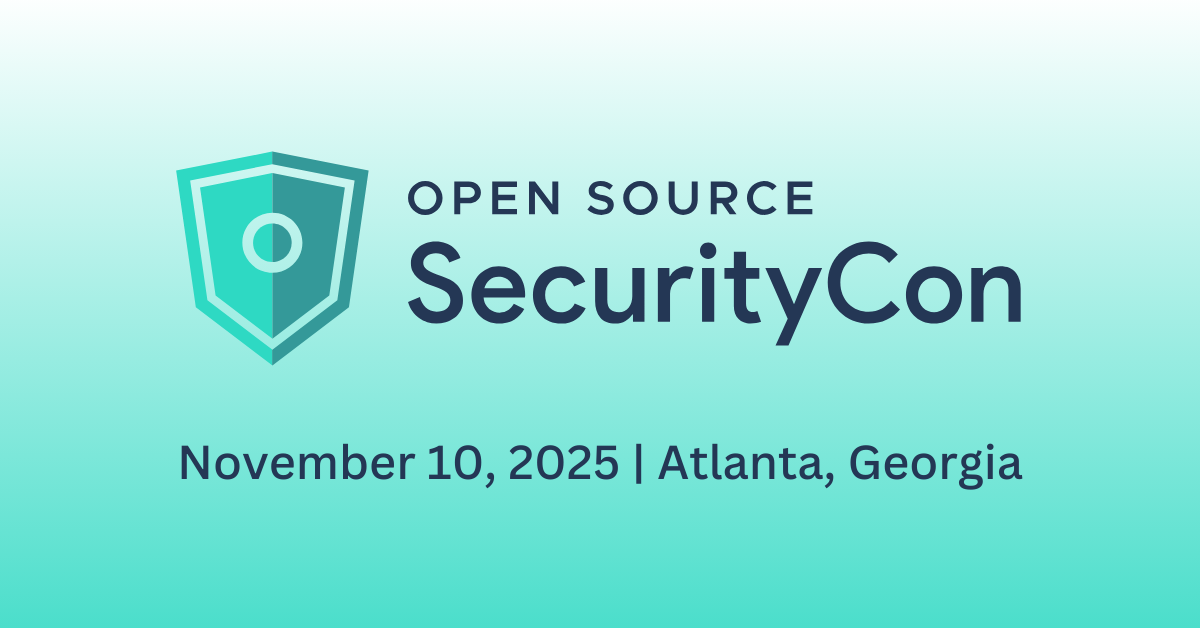
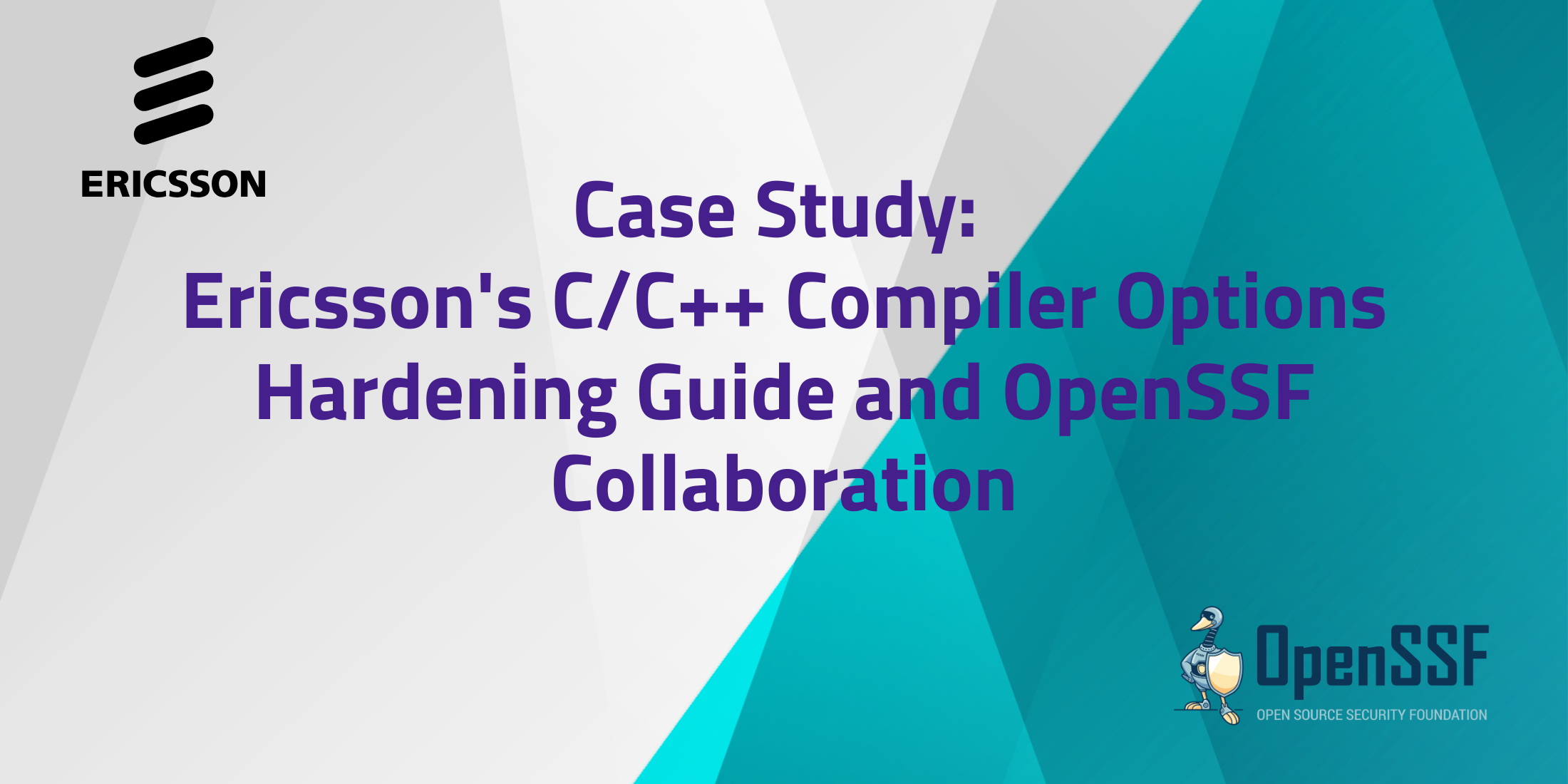
Ericsson, a global leader in telecommunications and networking, has been deeply engaged in open source and software security for over a decade. Through its Open Source Program Office (OSPO), Ericsson coordinates its participation across multiple foundations and initiatives, including the Open Source Security Foundation (OpenSSF). This case study highlights Ericsson’s collaboration with the OpenSSF, with a specific focus on their C/C++ Compiler Option Hardening Guide, which has served as both an internal resource and a community contribution.
C++ remains a foundational language in many critical systems, but it’s notoriously difficult to use securely. Given the massive volume of existing C and C++ code underpinning today’s infrastructure, many organizations today face a familiar dilemma: how to improve the security of these systems without the unrealistic burden of rewriting everything in a memory-safe programming language. The team recognized the need for a pragmatic solution that could strengthen existing infrastructure.
Ericsson, together with partners found through its engagement in the OpenSSF, developed and released the C/C++ Compiler Option Hardening Guide as a practical approach to increasing software security through better compiler configurations. The guide maps out various hardening flags and compiler options, analyzing their implications on performance and security. Originally drafted by Ericsson’s product security team, the initial guide was donated to the OpenSSF and is now jointly developed in the Best Practices Working Group of the OpenSSF.
Open sourcing the guide proved invaluable. By contributing it to the OpenSSF, Ericsson gained access to a wider range of expertise—receiving high-quality feedback from compiler maintainers, Linux distribution contributors, and others across the ecosystem. These external insights not only validated Ericsson’s approach but improved the guide itself.
In addition to the compiler guide, Ericsson is co-chairing the Best Practices Working Group and leading the development of a Python Secure Coding Guide therein.. The team also benefits from other OpenSSF work, such as threat modeling and participation in the AI/ML security working group.
“We’ve seen tremendous value in contributing our C/C++ Compiler Options Hardening Guide to the OpenSSF. The community feedback significantly improved the guide and validated our approach. It’s a win-win—for our internal teams and the broader open source ecosystem.” — Mikko Karikytö, Head of Product Security & CPSO
Ericsson plans to continue contributing to and evolving its secure coding practices through collaboration with the OpenSSF. As part of that commitment, Ericsson encourages peers in telecom, networking, and adjacent industries to explore the C/C++ Compiler Options Hardening Guide, apply its recommendations, and contribute to its ongoing improvement.
🔹 Visit Ericsson’s Open Source Program Office (OSPO) page to learn more about their broader open source strategy.
🔹 Get involved with the OpenSSF Best Practices Working Group to shape and support secure software development practices.
Ericsson has been a vocal advocate for responsible open source use and software security. Its OSPO leads efforts across multiple standards bodies and open source foundations. The OpenSSF provides a vendor-neutral forum for collaboration on secure software development and supply chain security.
For more case studies, visit: https://openssf.org/case-studies/
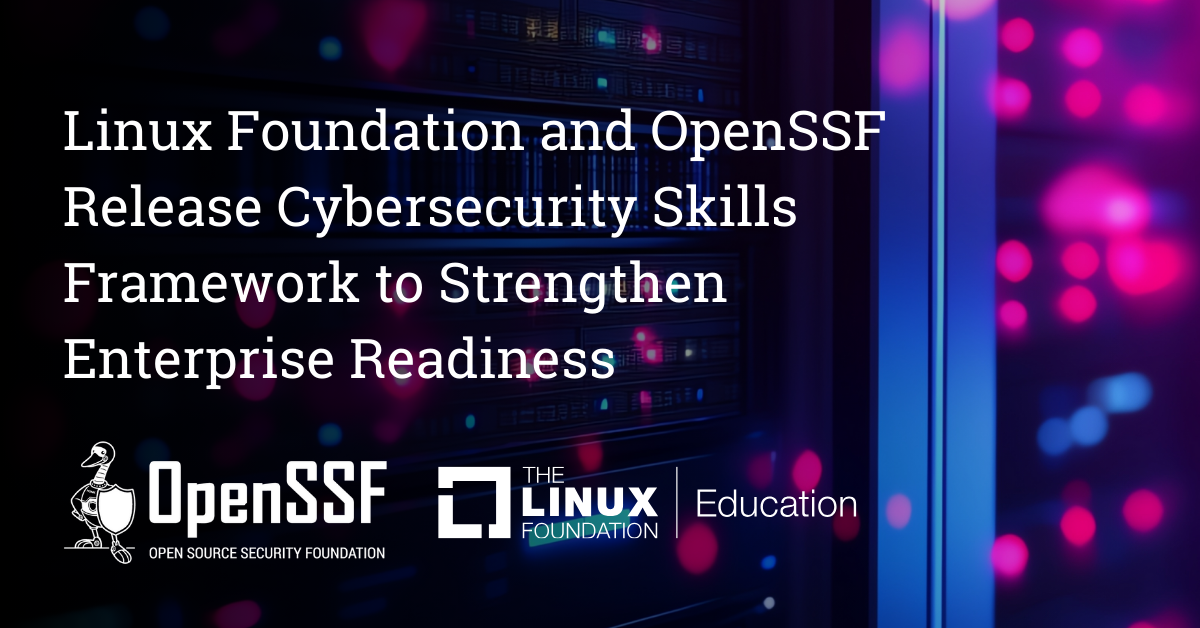
New Customizable Global Framework Aligns IT Job Roles with Practical Cybersecurity Skills
SAN FRANCISCO, CA – May 14, 2025 – The Linux Foundation, the nonprofit organization enabling mass innovation through open source, today announced the launch of the Cybersecurity Skills Framework, a global reference guide that helps organizations identify and address critical cybersecurity competencies across a broad range of IT job families; extending beyond cybersecurity specialists. Produced in collaboration with the Open Source Security Foundation (OpenSSF) and Linux Foundation Education, the framework delivers actionable guidance to enterprise leaders looking to systematically reduce cyber risk.
As cybersecurity threats grow in both scale and complexity, enterprise leaders are struggling to align job roles with the practical skills needed to mount an effective defense. Despite cybersecurity being one of the top three most in-demand tech roles for enterprises, major talent readiness gaps remain. According to the Linux Foundation’s 2024 State of Tech Talent Report, 64 percent of organizations report candidates lack essential skills and it now takes an average of 10.2 months to hire and onboard new technical staff. Additional research from the Linux Foundation found that 62 percent of open source project stewards lacked dedicated personnel for security incident response, despite 74 percent maintaining formal cybersecurity reporting mechanisms.
These trends reflect a broader industry dilemma—growing awareness of cybersecurity needs without the personnel to tackle them—driven by unclear role expectations and fragmented training pathways. The Cybersecurity Skills Framework addresses these issues with a practical, globally relevant onramp that organizations can use to assess and build internal security capabilities. The framework provides leaders with an easy way to understand the cybersecurity skills needed, quickly identify knowledge gaps, and incorporate critical skills into all of their IT roles. By establishing a shared language for cybersecurity readiness, the framework prepares everyone who touches a system to take responsibility for security, not just the cybersecurity specialists: from app developers to web developers, network engineers to database engineers, solutions architects to enterprise architects.
The framework defines practical cybersecurity expectations across foundational, intermediate, and advanced proficiency levels, while mapping those skills to recognized standards such as the DoD 8140, CISA NICE Framework, and the ICT e-CF. By aligning with widely adopted standards and allowing for customization, the framework can be easily adopted across industries, regions, and organizational sizes. The framework is available in a free, easy to use web interface which allows users to select relevant job families, move skills between categories, delete any that don’t apply and add custom items they require.
The framework was produced as a result of a global research effort, with contributions and feedback from cybersecurity educators, government advisors, framework stewards, and technical training experts, who together brought comprehensive expertise in workforce development, national defense, professional certification, and open source security.
“Cybersecurity is now a leadership issue, not just a technical one,” said Steve Fernandez, General Manager at OpenSSF. “Our framework gives organizations a straightforward way to identify gaps and prioritize the security skills that matter most, based on role and responsibility—not just checklists. It’s about building real-world resilience.”
The Cybersecurity Skills Framework provides guidance for key roles, including web and software developers, DevOps engineers, IT project managers, platform architects, GRC managers and more. Each job role is defined by its primary cybersecurity responsibilities and aligned with practical skills in areas like secure design, compliance, vulnerability management, and incident response.
“This framework is a valuable tool for CIOs, CISOs, and enterprise learning teams,” said Clyde Seepersad, SVP and General Manager of Linux Foundation Education. “In an era of accelerating threats, leaders need clear pathways for strengthening security culture across technical teams. This resource helps organizations take a proactive approach to employee development and risk reduction.”
The Linux Foundation and OpenSSF will update the framework annually and welcome community feedback from adopters. Organizations are encouraged to adapt and extend the model to align with their specific needs, security posture, and product portfolios.
To access the full Cybersecurity Skills Framework and explore how your organization can adopt it, visit: http://cybersecurityframework.io
Join us on Wednesday, June 11 at 11:00 am EDT for a webinar discussing the Cybersecurity Skills Framework. Visit here to register.
Supporting Quotes
“As cloud native adoption grows, so does the complexity of managing security across distributed systems. The Cybersecurity Skills Framework offers a clear, actionable resource for teams working in modern environments to assess skills, reduce risk, and embed security into every stage of the software lifecycle.”
– Chris Aniszczyk, CTO, CNCF
“As the cybersecurity landscape grows more complex, particularly with the rapid rise in AI technologies, security can no longer be siloed. Businesses must champion a culture of security awareness, education, and preparedness across functions. The new framework contributes to a stronger security posture by ensuring every team—from developers to IT leaders—understands the specific security skills they need.”
– Jamie Thomas, IBM Enterprise Security Executive
“Cybersecurity is a shared responsibility, and closing the skills gap is essential to building secure systems at scale. The OpenSSF Cybersecurity Skills Framework provides a clear, actionable roadmap for equipping technical teams with the right knowledge to protect our digital infrastructure, thus raising the bar for security readiness across the industry.”
– Arun Gupta, VP of Developer Programs, Intel / Governing Board Chair for CNCF & OpenSSF
“Cybersecurity today seems more complicated than ever. It can be difficult to keep up with the evolving cyber risk landscape and what skills internal teams need to approach and mitigate those risks. The Cybersecurity Skills Framework is a much needed blueprint for how developers should approach career development, teams plan for adapting to new risks, and organizations build training governance for the continuous evolution of their cybersecurity programs.”
– Michael Lieberman, CTO and Co-Founder, Kusari
“The Cybersecurity Skills Framework is grounded in extensive global research and community collaboration. By surfacing practical, role-specific insights, the framework helps enterprise leaders understand where their cybersecurity capabilities stand—and where they need to grow. It’s a meaningful step toward bridging the persistent skills gap we’ve seen across sectors.”
– Hilary Carter, SVP Research at the Linux Foundation
“Security is a shared responsibility across the open source ecosystem. This framework is a powerful tool to help developers, project leaders, and enterprise teams better understand how their roles contribute to a secure software supply chain. It supports the kind of continuous learning culture that is essential to sustainable open source development.”
– Robin Bender Ginn, Executive Director, OpenJS Foundation
“The need for experienced cybersecurity practitioners continues to increase, and a clear understanding of cybersecurity roles, responsibilities, and required skills is not just beneficial – it is the foundation for a resilient and secure organization. The Linux Foundation’s Cybersecurity Skills Framework provides guidance to help leaders and practitioners understand the baseline skills needed for various roles. It serves as an excellent starting point for cybersecurity practitioners looking to enter the field or plan their career progression. Additionally, it helps leaders identify the necessary roles and skills to meet their cybersecurity demands.”
– Dave Russo, Senior Principal Program Manager, Secure Development, Red Hat
###
About the Linux Foundation
The Linux Foundation is the world’s leading home for collaboration on open source software, hardware, standards, and data. Linux Foundation projects are critical to the world’s infrastructure, including Linux, Kubernetes, LF Decentralized Trust, Node.js, ONAP, OpenChain, OpenSSF, PyTorch, RISC-V, SPDX, Zephyr, and more. The Linux Foundation focuses on leveraging best practices and addressing the needs of contributors, users, and solution providers to create sustainable models for open collaboration. For more information, please visit us at linuxfoundation.org.
The Linux Foundation has registered trademarks and uses trademarks. For a list of trademarks of The Linux Foundation, please see its trademark usage page: www.linuxfoundation.org/trademark-usage. Linux is a registered trademark of Linus Torvalds.
Media Contact
Noah Lehman
The Linux Foundation
nlehman@linuxfoundation.org
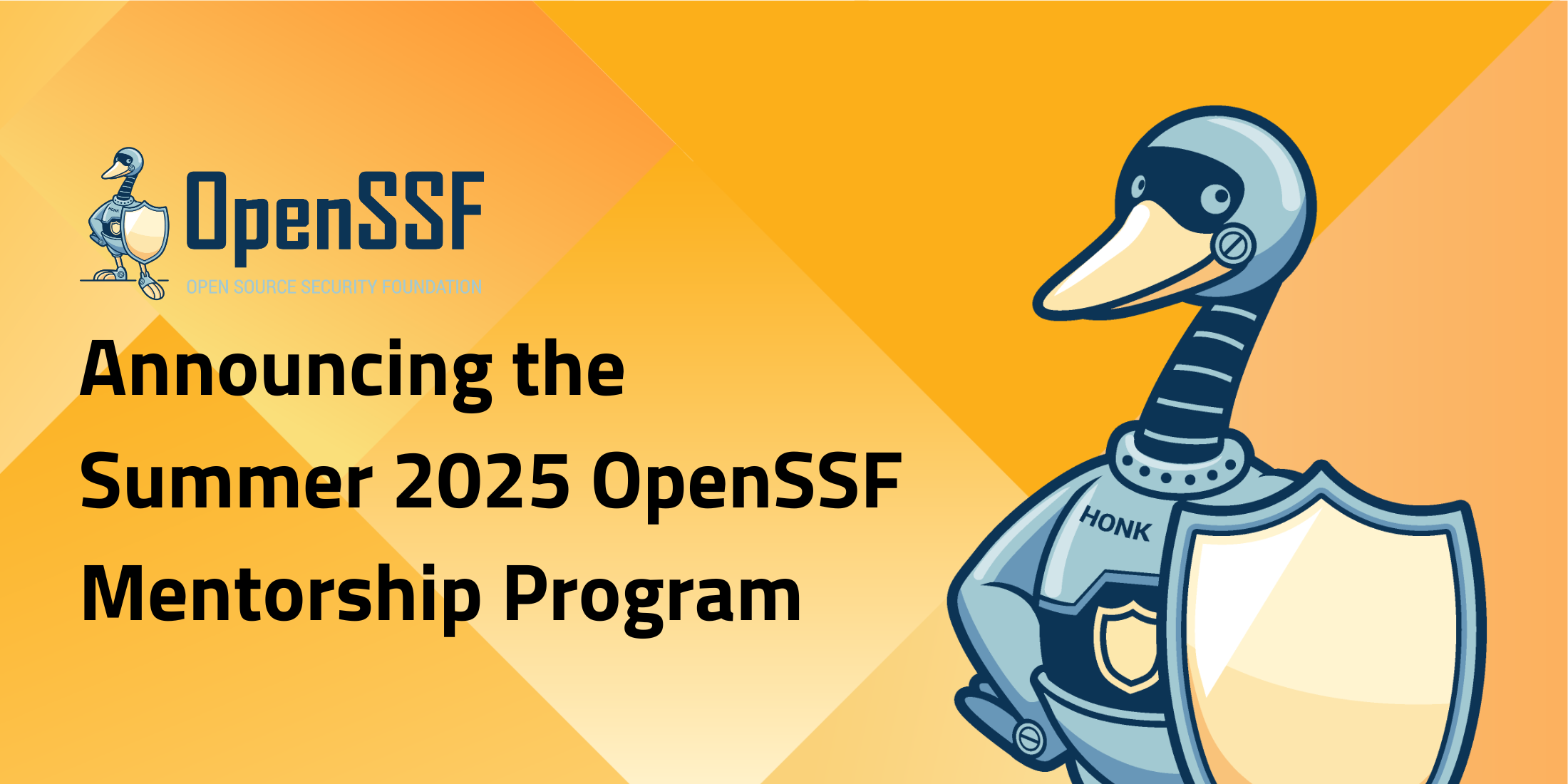
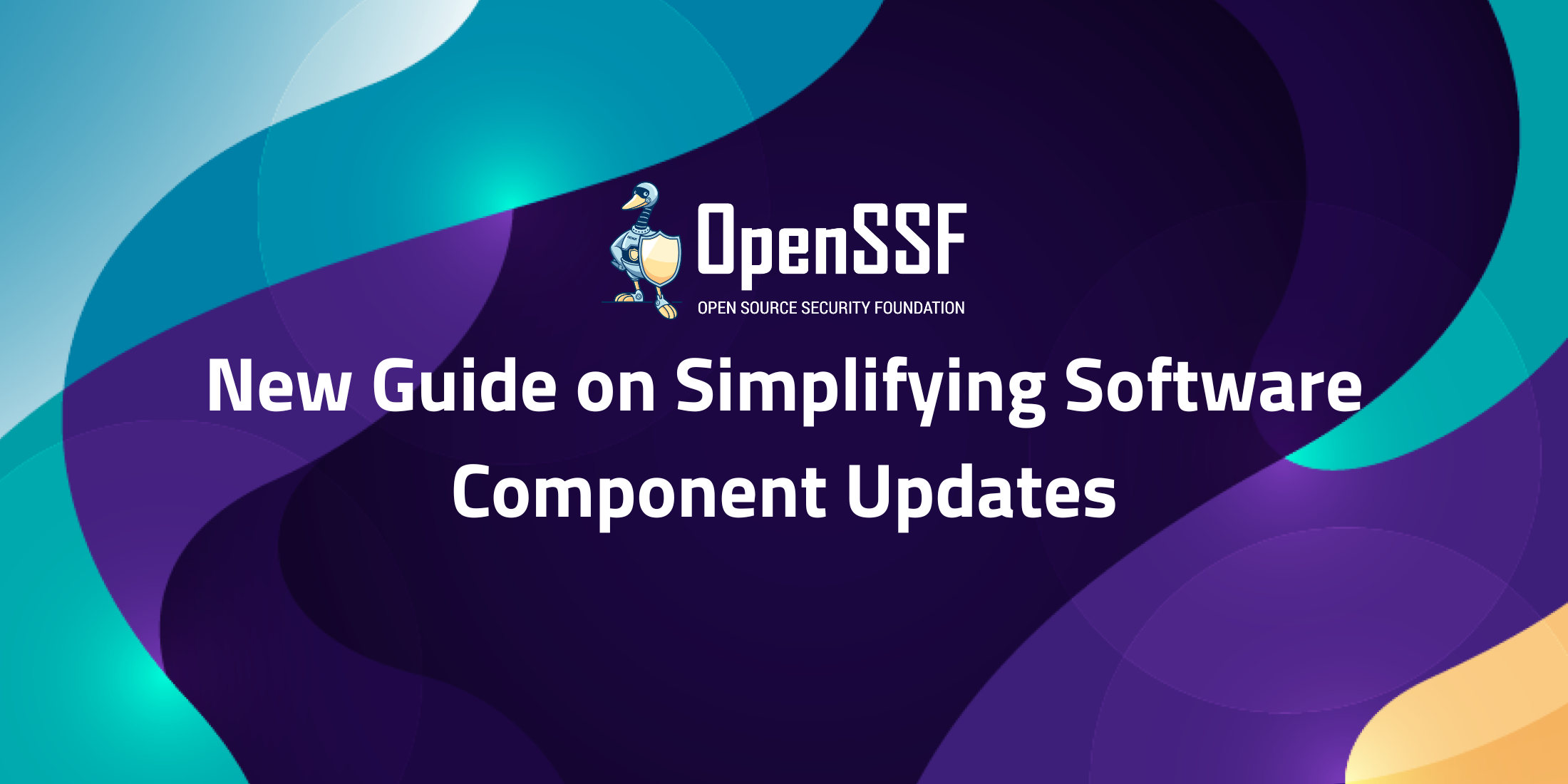
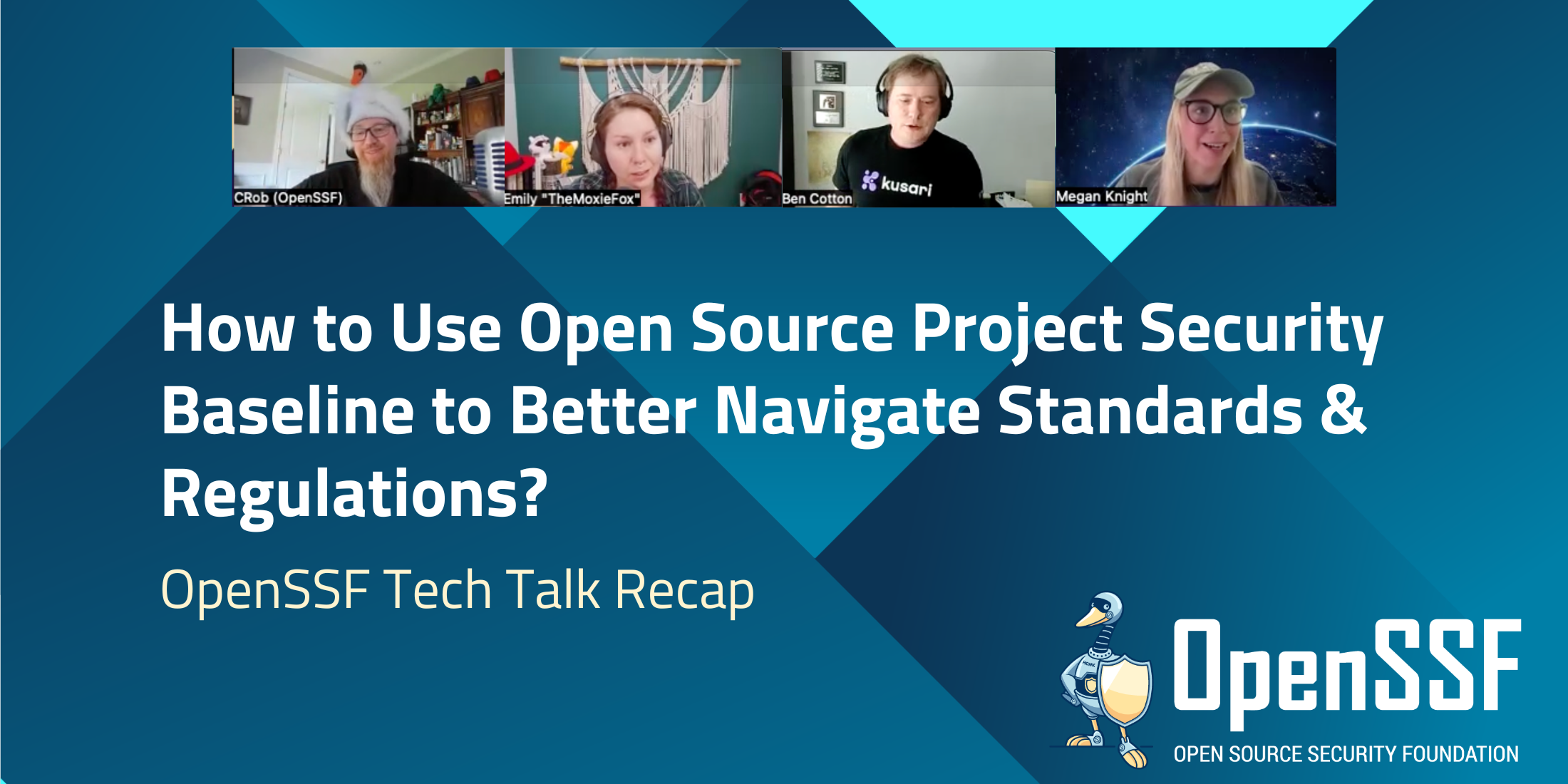
In this special episode of What’s in the SOSS?, we welcome Stacey Potter, the new Community Manager at the Open Source Security Foundation (OpenSSF). Stacey shares her winding journey from managing operations at a vitamin company to becoming a powerful advocate and connector in the open source world. We explore her community-first mindset, her work with CNCF and Platform Engineering Day, and her passion for inclusion and authenticity. Whether you’re curious about how to get started in open source or want insight into how community shapes security, this episode is for you.
00:00 – Welcome + Introduction
01:34 – Stacey’s Origin Story in Open Source
03:18 – Discovering Community Management at Weaveworks
04:19 – Projects and Evolution Across CNCF and Beyond
06:13 – Co-Chairing Platform Engineering Day
10:15 – Being Openly Queer in Open Source
13:38 – What Stacey Hopes to Bring to OpenSSF
16:23 – Rapid Fire Round
17:53 – Final Thoughts
Intro music (00:00)
Stacey (00:02): “It’s given me a deep understanding and appreciation for inclusiveness and being a welcoming community – I have always felt embraced here, these spaces have empowered me to show up fully as myself”
Yesenia (00:021)
Hello and welcome to What’s in the SoSS? Open SSF’s podcast where we talk to interesting people throughout the open source ecosystem, sharing their journey, experiences and wisdom. So Yessenia, I’m one of our hosts and today we have a special announcement and introduction. I am talking to OpenSSF’s Community Manager, Stacey Potter. Welcome to the open source community. Stacey, please introduce yourself to the audience.
Stacey Potter (00:48)
Hey, everyone. Thanks, Yesenia. So I’m super happy to be here. I just joined and think this is week four that we’re recording this right now. So by the time this gets posted, I might have been here for a little bit longer. But I am the new community manager here at OpenSSF. So I am here to facilitate events. I’ll be managing budgets in the background. And in general, just promoting the foundation and all of our technical initiatives. So super stoked to be here. Can’t wait to meet everybody either in person, online, in Slack, et cetera. So super happy.
Yesenia (01:25)
Super, super happy to have you and we’ll kick it off with our first question. Tell us about your journey in the open source world and just what sparked your curiosity.
Stacey Potter (01:34)
Yeah, so honestly, my path into software was more a result of circumstance than intention. I transitioned into the industry a little bit later in my career. Before that, I was working as an operations manager at a small family-run vitamin company based out of Oakland, California. And after I left that role, I applied for an office manager position at a San Francisco startup focused on what we now call Software Composition Analysis or SCA. Though I don’t even know if it was called that back then in 2009. And at the time, our tagline was something like open source software security for enterprises or something like that. I think a lot of people will know our main competitor, which was Black Duck Software. But we were just a tiny little startup having fun in San Francisco.
And that role was really like my first exposure to the world of open source, but not in a really direct way because I wasn’t working with it. And I almost felt like we were kind of pulling open source out of enterprises or making it more restrictive in certain ways. Cause it was like we were bringing to light all the open source licenses and if you should or shouldn’t use them in an enterprise, right? So it felt a little ambiguous, right?
But I spent seven years there working with the CEO and gradually kind of moved through different roles at that company. I was great about working at a startup. I was the sales operations manager. And then later I transitioned into marketing. And then that company got acquired and I stayed on for a couple more years doing marketing things. And then I transitioned out of there in 2019 and went to Weaveworks where I feel like my true journey with open source really began. I started working at Weaveworks and as a community manager at that point, transition from marketing went into community management. Thanks to general good faith in my boss at the time, which was Tama Nakahara. She’s amazing and an amazing mentor. And she was like, I have marketing, you’re fine. You’re personable. You’ll be great as a community manager and really took me under her wing and taught me everything I needed to know. And learning all about Flux and Flagger in that CNCF ecosystem and really being embraced within those communities was where I feel like it really truly began.
Yesenia (04:09)
Nice. It’s nice little journey to start and then just what brought you here now to OpenSSF? Did you come from there or have you explored other open source projects that you would like to mention?
Stacey Potter (04:19)
Yeah. So Flux and Flyer were my true introduction. Been in and around the CNCF for a while. After Weaveworks, I went to Dynatrace and worked on the Open Feature project and the Kept project, which are both CNCF projects as well. Super great communities there as well. And then after Dynatrace, I went to Stacklok, which is another startup. And they had a project called Minder, which we donated to the OpenSSF. And I had kind of heard musings of the OpenSSF when I was kind of in that CNCF ecosystem before, but didn’t really know a whole lot about it. And when I worked at StackLock, kind of became more familiar with the community. We donated that project. I went through the entire process of like what donating a project looks like within the OpenSSF ecosystem. So that was fun and interesting.
Yesenia (05:11)
Interesting.
Stacey Potter (05:18)
And yeah, that’s StackLock like switched positions. It kind of is going a different route now. And so I came to OpenSSF just almost a month ago, not quite a month ago, so three weeks ago now. And yeah, that’s how I got here.
Yesenia (05:31)
That’s amazing. Here you are. Perfect. Yeah, it sounds like a good experience exposure with community building and open source projects for CNCF and OpenSSF, which are big, big organizations when it comes to open source. So very interesting, very interesting indeed. So we’ll move on to the next question. This is during my online recon, we’ll say, consented recon. I discovered you are the co-chair of Platform Engineering Day. Can you share with the audience what this is, what the event is, and what excites you the most about working with this community?
Stacey Potter (06:13)
Yeah, absolutely. So Platform Engineering Day, mean, well, as internal developer platforms, IDPs, really help dev teams move faster by giving them tools and frameworks that they need, right? So Platform Engineering Day is all about sharing real world tips on building great internal platforms, not just the tech, but the people and the processes as well, right? So it’s a chance for platform folks from all different job titles and job roles to trade stories, lessons, and ideas on making the dev experience awesome. So what excites me about working in this community? I think there’s just so many passionate people involved in this space. I know Platform Engineering Day has become kind of this buzzy word of late, right?
Yesenia (07:11)
Marketing.
Stacey (07:13)
Exactly. But I mean, to the people who are in it, they, from my perspective, as I’ve gotten involved in it, they’re super passionate folks, right? And they really want to make this experience, you know, as good as they can. But after chatting with Paula Kennedy, who is my co chair, and Abby Bangser, whom I got to know through an old Weavework’s colleague, we felt the need for not just a bunch of tech talks on the topic. But really, we wanted to provide, as I said before, a place where platform engineers, product managers, solutions architects, and other folks could come together and share lessons learned in building and managing internal platforms, measuring platform maturity and improving these golden paths and the developer experience as a whole.
Yesenia (08:04)
Nice, do you want to do a quick plug on when the next platform engineering day is?
Stacey Potter (08:08)
Well, it’s a colo with KubeCons. So if you’re going to the next KubeCon, which I believe is North America in Atlanta, Georgia, for all those folks who are outside of the States, I’m sorry, that you may or may not be able to come here based on a number of different things. But we’re trying to do it co-located in general with KubeCons, because it kind of fits there and makes sense. And we’ve had a great response so far, right? The first one, we got more CFPs than any other co-located event had ever gotten at any KubeCon, colo event before. And I think we had hundreds and hundreds of folks in the seats listening to all these great talks. And I’ll also just highlight the platform’s working group within the CNCF too. This is a great team of people working on all things platform related. And if you’re interested in learning more about platform engineering in general, the platforms working group within the CNC app is really a great place to go.
Yesenia (09:15)
Yeah, I didn’t know that it was in KubeCon. I’m hoping to go my first year this year in Atlanta.
Stacey Potter (09:21)
Yeah. Yeah. I think Paris was our debut. Yeah. Yeah. Right. Not bad. And we just had our last one in London. Yeah.
Yesenia (09:24)
Hmm, that’s a good debut. Fashion debuted there. there you go.
Stacey Potter (9:31)
We’re so fashionable. Who knew?
Yesenia (09:36)
Talking about fashionable. During my cyber roots, I found your GitHub profile, which I loved and made me giggle and smile in several locations. But you noted you’re queer and for recording purposes, AF. I’d love to hear your perspective on how this has transformed your journey and influenced you being involved in these open source communities and anything you want to share with the audience.
Stacey Potter (10:15)
Sure. So being openly queer in tech and the open source space has been a pretty powerful part of my journey, I guess, in retrospect. It’s given me a deep understanding and appreciation for inclusiveness and being a welcoming community, regardless of what the, I guess, we’re going to call it difference is for whomever is coming into your community.
I think something I’ve been lucky to experience in the Kubernetes and cloud native and broader open source ecosystems is that welcomeness, that feeling of belonging. I’ve never felt like I didn’t belong here, right?
Yesenia (10:45)
Yeah.
Stacey Potter (10:48)
Which I think is pretty special. I mean, it’s a privileged place to be, I think in certain ways too, right? Like I am a cis white woman, right? But I present as butch and I’m you know, that’s my that’s what I call myself, right? That’s how I identify. And some people could be put off by that. But I have always felt embraced here. And, you know, like these spaces have empowered me to show up fully as myself, which has not only boosted my confidence, but also allowed me to connect with and, you know, mentor, I guess, others navigating similar paths, whether that’s being queer or being a woman or whatever.
I think visibility matters and I found that authenticity can be a bridge, right? Whether it’s in a code review, which I don’t do by the way, community calls or just, you know, contributing to projects that reflect shared values that you have, right?
Yesenia (11:48)
Yeah, it’s great because that’s the underlying foundation of open source. It’s just a community of anyone that can come in and contribute and make a project, move a project and make it successful and gave me a little bit of goosebumps there as you were speaking on that one. But because I feel the same when it comes to like the open source space is just they’re very welcoming. Every time folks are like, I’m just so scared. I’m like, trust me, don’t just go ask the questions. Like this is the place to ask the technical quote unquote “this is a dumb question…”
Stacey Potter (12:15)
Yeah, and I mean, they’re just so happy. What I have found is everyone in these communities is just so happy for people to notice them to want to get involved in the first place, right? Like they’re so stoked that you’re there. Like whatever your skill set is, they’re willing to bring you into the fold, right? They’ll make it work.
Yesenia (12:22)
Yeah.
Yesenia (12:41)
We’ll figure it out.
Stacey Potter (12:41)
You don’t need to know how to code, right? Work on docs, work on…community management, promote our events, like make us a poster or a cool logo or I mean, there’s so many different ways you can contribute if you don’t write code. I don’t write code and this is my job now. I would have never thought, right? Yeah.
Yesenia (13:00)
Yeah. Who would have thunk it? Yeah, I haven’t written code in such a long time. I write for my own like fun, so I don’t lose the skill. You know, it’s like riding a bike. I’m hoping it’s like riding a bike that you never forget, but I forgot because once again, short term memory issues.
Stacey Potter (13:12)
Yeah, right, right.
Yesenia (13:17)
Ah, this is great. Moving on to the next. You are the newest member of OpenSSF. I’m sure other folks have been hired, so I’m sorry if there’s anybody that’s newer, but as far as his recording, this is what I know. And now the Community Manager, what would you like to see in the upcoming months with the impact you plan to ripple through this ecosystem?
Stacey Potter (13:38)
Wow, that’s a big question. So as the newest member of the OpenSSF team and like you said, the community manager here, I’m really excited to help grow and connect this vibrant ecosystem. In the coming months, I think I want to focus on making it easier and more inviting for people to get involved. Whether you’re seasoned security pro or just a curious first timer, I think a lot of people don’t even know that we exist maybe – the OpenSSF. So I think just awareness in general is also something that I’d like to help promote. But know, like smoothing out the onboarding journey, launching programs like the Ambassador Initiative. I think there’s been a lot of talk internally about trying to ramp that up and get that going and supporting mentorships that help contributors thrive. I’d love to see more stories, more collaboration across projects within the OpenSSF and externally within other communities like maybe CNCF, since that’s where my prior history is, right? And more representation from folks who may not traditionally see themselves in the security space. OpenSSF already has amazing technical initiatives. My goal is to amplify the voices behind them, create inclusive pathways into our work and build bridges to other communities who share our mission. So whether it’s through meetups, events, or even just a warm welcome in Slack, I want everyone to feel like there’s a place for them here.
Yesenia (15:15)
I love it. You’re full of the goose bumps today. I love that warm welcome on Slack. You had mentioned the ambassador program. I personally haven’t heard of it. Is there any, I know you guys are just, it’s in the works. Anything you want to share about it.
Stacey Potter (15:29)
Well, it’s gonna be a top priority for me as soon as I sort of get my feet, find my feet here, right? It’s only week four. But it’s definitely a priority that we want to get this out as soon as possible. And there’s already been so much work done before I came. So it’s getting me up to speed and then, yeah, I’m just super excited. think it encourages more people to join sort of.
Yesenia (15:37)
Yeah
Stacey Potter (15:56)
Also celebrating those who have made us who we are so far as well. But then, you know, lots of people would love to become an ambassador that don’t know how to get started or things like that, right? And bringing more people into the fold.
Yesenia (16:09)
Love it, love it. Well, I look forward to seeing the announcement news and learning more about that. So for those folks listening, hopefully it’s released. Hopefully it’s in the works by the time you listen to this. All right, cool. We’re going to move over to the rapid fire. I just make noises because I don’t get, Krobe’s a fancy noise maker. So we’ll go with the flow with whatever my ADHD brain decides to do. And our first question, Disney or Pixar?
Stacey Potter (16:40)
Pixar for sure. I used to live like around the corner from Pixar, so, and I’ve always been a huge Pixar fan, but this is an acquired Pixar, so they’re one and the same now,
Yesenia (16:52)
In my heart, are they really?
Stacey Potter (16:55)
Yeah, no, in our hearts we know the truth, but Pixar, yeah.
Yesenia (17:02)
Dark or light mode?
Stacey Potter (17:05)
Dark.
Yesenia (17:06)
Dark as my soul.
Stacey Potter (17:09)
Black is the night.
Yesenia (17:11)
Cats or dogs? as she takes a sip of coffee.
Stacey Potter (17:15)
Both. I have two cats and a dog, and they’re all amazing. I love them both for very different reasons.
Yesenia (17:22)
Yeah, I can’t choose between my five, so.
Stacey Potter (17:26)
Oh wow. That’s a lot.
Yesenia (17:29)
Alright, this next question and it may cause chaos to our listeners, alright? Linux Mac or Windows?
Stacey Potter (17:38)
Well, I’m a non-coder, so, and I’m a Mac gal.
Yesenia (17:44)
Mac, there it is. Well, there you have it folks. It’s another rapid fire. Any last minute advice or thoughts for the audience you’d like to share?
Stacey Potter (17:53)
Well, I’ll do some shameless plugging of our upcoming events because I’d love to connect with you all in real life and these events are great places for our community to get together and share ideas and progress on the capabilities that make it easier to sustainably secure the open source software on which we all depend. You can find all of these listed on our website at openssf.org/events
So, we’re going to be hosting some upcoming events:
We’ll also be attending & sponsoring events for the remainder of the year as well:
I can’t wait to meet you all. I’m super excited to be here. And if you join us in Slack, please say hi. If you have any interest in any of our projects, I just encourage you to just jump in, right? Say hello. And usually that’s all it takes to get a really warm welcome from anyone in this community. And I look forward to working with all of you.
Yesenia (20:16)
There you have it from Stacey Potter. Thank you for your impact and contributions to our open source communities. I’m looking forward to the impact that you’ll have and how your ripple effects the open SSF being a part of it. Stacey, I appreciate your time and thank you.